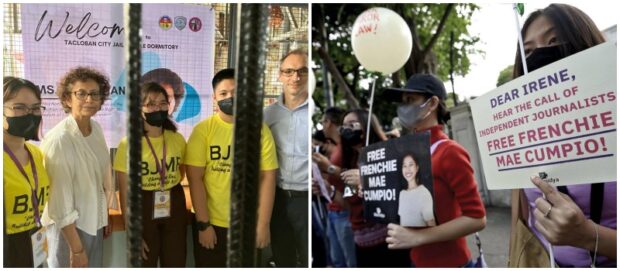
SOLIDARITY | United Nations Special Rapporteur on Freedom of Expression and Opinion Irene Khan visits detained journalist Frenchie Mae Cumpio and two other human rights advocates in Tacloban City on Saturday, Jan. 27, 2023. Cumpio turned 25 on Jan. 23. Members of various media groups gathered that day outside the Department of Justice to call for her release. (Photos from the Facebook page of IRENE KHAN and by RICHARD A. REYES / Philippine Daily Inquirer)
MANILA, Philippines — “How long must they wait to be free?”
Thus said Irene Khan, the United Nations special rapporteur on free speech, after visiting a detained journalist and two human rights advocates at Tacloban City Jail over the weekend, as she lamented their continued detention for four years now.
Khan, in a tweet on Sunday, posted a photo of her visit on Saturday to the three detainees, journalist Frenchie Mae Cumpio and rights activists Marielle Domequil and Alexander Abinguna.
The three have been in prison, together with two others, on charges of illegal possession of firearms and explosives. But critics said their detention followed a pattern of state-sponsored repression against journalists and human rights activists.
‘Direct insult’
Khan said in her tweet: “We are [the] only [international] visitors so far allowed by [the] Philippines government to visit them!”
“Arrested in [February] 2020, still dragging on. How long must they wait to be free?!” she added.
This prompted a response from the National Task Force to End Local Communist Armed Conflict (NTF-Elcac).
In a statement sent to the Inquirer by Secretary Paul Gutierrez of the Presidential Task Force on Media Security, prosecutor Flosemer Chris Gonzales, spokesperson for the NTF-Elcac in Western Visayas, said Khan’s “seemingly harmless question” is a “direct insult on the independence and the integrity of the Philippine judicial system and processes.”
“Ms Khan must be reminded that the outcome of the trial of any case pending before Philippine courts is not subject to speculation, conclusion and/or any ideologically based assumption,” Gutierrez said, quoting Gonzales.
Regarding Khan’s question in her tweet, Gonzales said: “To ask a question that puts forward the assumption that the three PDLs (persons deprived of liberty) will be free is tantamount to encroaching on the functions of the courts and puts a cloud on the competence and integrity of our country’s law enforcement agencies and our prosecutors.”
Being a guest in the Philippines, Khan “must observe prudence and tact in her statements,” he added.
“She must choose her words carefully, particularly when she is dealing with the inherent and sovereign powers of this state to implement and execute our laws, the dispensation and administration of justice, and the manner by which this sovereign and independent state protect (sic) its citizens from all threats of terrorism, foreign and domestic,” he also said.
Cumpio, Domequil and Abinguna were part of the so-called “Tacloban 5,” who were arrested during a series of police raids on Feb. 7, 2020.
The remaining two accused, Marissa Cabaljao and Mira Legion, are out on bail.
New supporter
International and local human rights and media groups have called for their release, saying the charges against them were “fabricated.”
The National Union of Journalists of the Philippines said in a statement: “The evidence against them were planted, and the testimonies against them falsified.”
Meanwhile, the NTF-Elcac has gained a new supporter from the religious community.
In a statement on Saturday, Undersecretary Ernesto Torres Jr., executive director of the task force, said it now has the backing of the Philippine Council of Evangelical Churches (PCEC).
He said the partnership with PCEC “marks a new era of hope and unity, as it aligns perfectly with NTF-Elcac’s innovative whole-of-nation and whole-of-society approach, setting the stage for an unprecedented push towards peacebuilding, social justice and development across the nation.”
The PCEC expressed its support for the government’s anti-insurgency body back in December with PCEC national director Bishop Noel Pantoja meeting up with NTF-Elcac officials, including its vice chair National Security Adviser Eduardo Año.
Pantoja said in his group’s statement that “We encourage all stakeholders to engage in peaceful dialogue and work towards addressing the root causes of conflict, while upholding the rule of law, dignity and rights of all individuals.”

